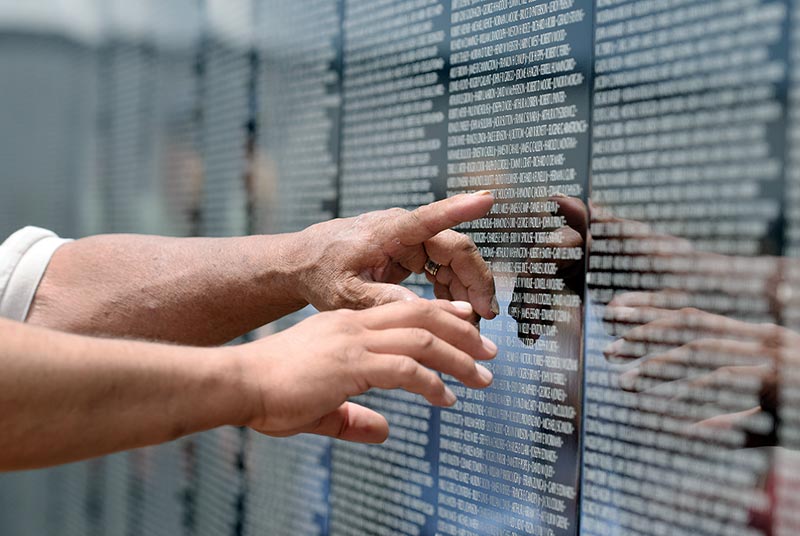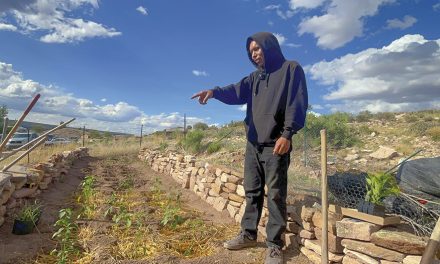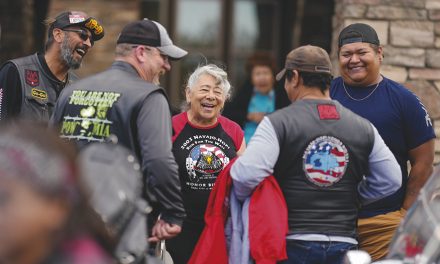
50 years ago: 3rd Diné dies in Vietnam; Treaty medallions for sale

Navajo Times | Donovan Quintero A father and his son read the names of fallen military personnel who gave the ultimate sacrifice during the Vietnam War last Friday during the Vietnam Veterans Memorial, The Moving Wall, opening ceremony at Twin Arrows Casino Resort.
For the third time since 1966, the Navajo Times published a story on a member of the tribe who was killed fighting in Vietnam.
Between 1965 and 1973, more than 4,000 Navajos would serve in Vietnam and the Navajo Times informed its readers not only where tribal members were stationed but when they were injured seriously or died. On Feb. 25, 1968, Army Spc.
Patrick Skeet was on a combat mission when he was killed by hostile forces. He was the son of Mr. and Mrs. Money Skeet who received their mail at the Cousins, New Mexico, Trading Post. He was a member of Company C, 2nd Battalion, 12th Cavalry. His services were held at the Pine Hill, New Mexico, mission.
The Navajo Times published several stories during the Vietnam War about the patriotism of Navajo young men who volunteered to go to Vietnam at a time when many young people were going to college or even Canada to avoid the draft.
Part of the reason, according to the Times, was because their fathers were veterans of World War II. While the role of the Navajo Code Talkers was known to some, it was not officially made public until that August so that definitely played a major role in recruitment from 1969 on. But the main factor was the efforts of recruiting officers during the war.
They visited reservation high schools several times during the school year, especially BIA boarding schools that had ROTC programs. In other news, the Times reported that the Navajo Tribe had produced some 5,000 centennial medallions which went on sale on Jan. 1 as part of the tribe’s celebration of the signing of the Treaty of 1868 a century before.
To the amazement of tribal officials, the medallions were selling like crazy. The Times reported that in the first seven weeks, 500 of the medallions were sold in El Paso, Texas, alone. They were also selling well on the reservation and Navajo Tribal Chairman Raymond Nakai would say that the medallions got the Navajo people in the mood for celebrating the centennial. The medallions, which occasionally still show up for sale on eBay for $80 or more, show scenes of a Navajo woman weaving, a hogan, farming, an oil well and a power plant.
The Times said the sale of the medallions in El Paso was pushed by four businessmen who promoted them as a public service to the Navajo people.
The big news this week had to do with peyote, which was still prohibited by the state of Texas for use by members of the Native American Church. The NAC wanted to change this so with the help of the Texas Civil Liberties Union they had the NAC president, David Clarke, arrested for possession of peyote.
The Texas Legislature passed the law banning the use of peyote the year before so Clarke was arrested to get the courts to rule on whether that law was constitutional. Clarke, by arrangement, was released on $500 bond, and waived a preliminary hearing, so the matter was sent to the district court. By now, the use of peyote by card-carrying members of the NAC had been recognized by almost every state as well as by the Navajo Tribal Council but Texas played such an important role in peyote use that Clarke decided it was important to get the issue resolved as soon as possible.
The reason is that roadmen for the NAC made numerous trips down to Texas every year to buy peyote and having a roadman arrested with a load of peyote could net him several years in state prison. That had not happened yet but Clarke knew it was only a matter of time since the only place in America where peyote was raised was in southern Texas.
Clarke said he was afraid that if any roadman were arrested, it would create a lot of problems for the NAC while if he did it, most people would view it as a test and it would not create alarm among NAC members. But test or no test, Clarke was taking a chance because if he was convicted, he could face up to five years in Texas prison.
Although the feeling was that if it came down to that, most judges would give him a suspended sentence and warn him that the courts may not be as lenient on other members who are arrested for possession. Still, attorneys for the Civil Liberties Union were confident they could win the case, primarily because courts in other states had ruled that banning peyote use by NAC members was unconstitutional.
To read the full article, pick up your copy of the Navajo Times at your nearest newsstand Thursday mornings!
Are you a digital subscriber? Read the most recent three weeks of stories by logging in to your online account.







 Highway 264,
Highway 264, I-40, WB @ Winslow
I-40, WB @ Winslow